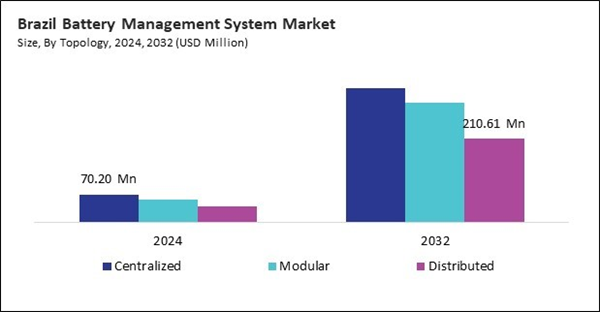The Brazil market dominated the LAMEA Battery Management System Market by country in 2024, and is expected to continue to be a dominant market till 2032; thereby, achieving a market value of $852.2 million by 2032. The Argentina market is exhibitng a CAGR of 24.9% during 2025-2032. Additionally, the UAE market is expected to experience a CAGR of 22.8% during 2025-2032.
The increasing focus on sustainability and battery recycling also shapes the market. Governments and environmental agencies emphasize battery reuse and recycling to minimize environmental impact. A BMS can monitor battery health and performance metrics throughout the battery lifecycle, identifying cells that can be reused or repurposed. This data-driven approach supports sustainable practices and reduces the economic cost associated with battery replacement and disposal.
The battery management system market is poised for continued growth, driven by technological advancements, regulatory support, and the rising demand for electric vehicles and energy storage solutions. As industries and consumers increasingly rely on battery-powered systems, the role of BMS becomes ever more critical in ensuring safety, efficiency, and longevity. In order to enhance and innovate BMS functionalities, companies allocate resources to research and development, with an emphasis on predictive maintenance, real-time data analytics, and compatibility with emerging battery technologies. In an era defined by the pursuit of sustainability and energy efficiency, BMS stands out as an essential technology, bridging the gap between evolving energy needs and practical implementation.
A dual focus on defense modernization and renewable energy adoption drives South Africa’s growing demand for BMS. Under its Defense Review 2015 strategy, the South African government modernizes military assets to improve national security and regional defense capabilities. Battery management systems are vital for powering advanced defense equipment, including surveillance drones and tactical communication devices. Simultaneously, the country’s push for sustainable energy through the Integrated Resource Plan (IRP) 2030 includes increasing wind and solar capacity, where BMS ensures battery safety and efficiency. The combination of defense upgrades and renewable energy initiatives creates a unique demand for BMS solutions that can operate efficiently across diverse applications. The dual focus on energy and defense makes South Africa a critical market for advanced BMS technologies. Thus, the growing adoption of electric vehicles, energy storage systems, and smart electronics will continue to drive the market across the region, fostering innovation and sustainable growth.
List of Key Companies Profiled
- Elithion, Inc.
- Texas Instruments, Inc.
- Sensata Technologies Holdings PLC
- LG Energy Solution, Ltd.
- Analog Devices, Inc.
- NXP Semiconductors N.V.
- Infineon Technologies AG
- Nuvation Energy
- Panasonic Industry Co., Ltd. (Panasonic Holdings Corporation)
- Robert Bosch GmbH
Market Report Segmentation
By Topology
- Centralized
- Modular
- Distributed
By Battery Type
- Lead-Acid Based
- Lithium-Ion Based
- Nickel Based
- Flow Batteries
By Application
- Consumer Electronics
- Automotive
- Energy
- Defense & Others
By Country
- Brazil
- Argentina
- UAE
- Saudi Arabia
- South Africa
- Nigeria
- Rest of LAMEA
Table of Contents
Companies Mentioned
- Elithion, Inc.
- Texas Instruments, Inc.
- Sensata Technologies Holdings PLC
- LG Energy Solution, Ltd.
- Analog Devices, Inc.
- NXP Semiconductors N.V.
- Infineon Technologies AG
- Nuvation Energy
- Panasonic Industry Co., Ltd. (Panasonic Holdings Corporation)
- Robert Bosch GmbH









